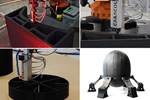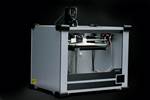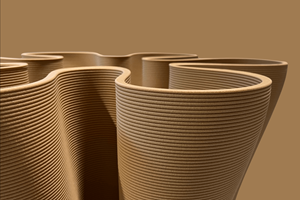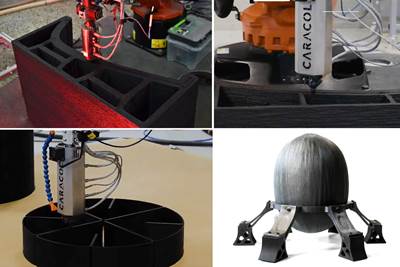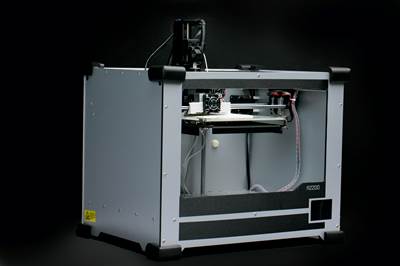Global consortium to bring high-value LFAM to the U.K.
The Evo One LFAM project will develop and commercialize a more supportive AM platform, which will include continuous fiber capabilities in the future, to increase accessibility for U.K. companies.
Rapid Fusion pellet extruder. Photo Credit: Evo-3D
Advanced additive manufacturing (AM) technology being developed by a global consortium of companies and academic institutes aims advance industrial AM in the U.K. The Evo One large-format additive manufacturing (LFAM) project — involving 3D printing experts Evo-3D (Exeter, U.K.); the National Manufacturing Institute Scotland (NMIS) operated by the University of Strathclyde and part of the High Value Manufacturing Catapult; Rolls-Royce (London); materials supplier Filamentive (Bradford, U.K.); software developer AI Build (London); and energy technology company Baker Hughes — are developing a 3D printer system. The initiative has received £1.1 million in funding from Innovate UK, the U.K.’s innovation agency.
LFAM is a commercial 3D printing technique that creates large-volume polymer components, used in a variety of industries including aerospace, automotive, energy and marine. While countries like the U.S., Germany and China have embraced this approach, there are currently no LFAM manufacturers in the U.K., and, , the country only accounts for around 5% of the global AM market, which the U.K. government aims to increase to 8% by 2025.
Access to the right technologies will be a crucial part of achieving that aim, but existing LFAM systems have their limitations. These include slow build times, being unsuitable for high-value or high-integrity parts, operational complexity, use of unsustainable materials and being unaffordable to small- and medium-sized companies.
At the project’s completion, Evo-3D will launch a spinout business to commercialize the system, called RapidFusion.
“We saw during the pandemic how easily supply chains can crumble,” Jake Hand, director of marketing and development at Evo-3D, says. “That’s why it’s potentially more important than it ever has been to develop as much capacity and capability in the U.K. as we can, not to mention the economic and carbon reduction opportunities associated with having a thriving manufacturing sector at the vanguard of the latest available green technologies.”
The new product being developed through Evo One LFAM will address the challenges associated with these systems and cater to the specific needs of the U.K. market. The system’s design team is aiming to make it 60% more reliable, achieve a 50% increase in productivity, reduce training and maintenance costs by 30%, and cut material waste by 80%, among a range of other improvements. It was noted that while fiber reinforcement will not be offered during initial product launch, due to the modular nature of the machine, there will be a continuous fiber module available in the future to purchase.
At the project’s completion, Evo-3D will launch a spinout business to commercialize the system, called RapidFusion, creating what is said will be the first U.K.’s OEM in LFAM. Its development would also create the foundation on which a new supply chain can be built, reshore critical manufacturing capabilities and help more U.K. manufacturers take advantage of the opportunities presented by Industry 4.0.
The NMIS team will support the project across a number of specializations, including material analysis, design and the AM process. It will also look at the validation and verification of the system and high-value materials being used. Rolls-Royce and Baker Hughes will test the system once it is ready, while AI Build will help with development of the slicing technology.
“With the right tools at our disposal, we can encourage more manufacturers of all sizes to embrace the latest manufacturing techniques and technologies, paving the way for a more sustainable and globally competitive sector,” Stephen Fitzpatrick, director – digital factory at NMIS, says.
Related Content
Combining multifunctional thermoplastic composites, additive manufacturing for next-gen airframe structures
The DOMMINIO project combines AFP with 3D printed gyroid cores, embedded SHM sensors and smart materials for induction-driven disassembly of parts at end of life.
Read MoreScaled Composites Model 437 aircraft to be flown for Beacon autonomy testbed
Northrop Grumman subsidiary part of Digital Pathfinder development of stealth aircraft with wings using continuous carbon fiber additive manufacturing and determinate assembly.
Read MoreSulapac introduces Sulapac Flow 1.7 to replace PLA, ABS and PP in FDM, FGF
Available as filament and granules for extrusion, new wood composite matches properties yet is compostable, eliminates microplastics and reduces carbon footprint.
Read MoreFIDAMC expands composites R&D into new markets and advanced manufacturing centers
Pioneering technocenter advances RTM, thermoplastic composites, additive manufacturing, microwire, novel lighter weight LSP and more.
Read MoreRead Next
Caracol AM launches new identity, celebrates composites applications
Italian supplier of Heron large format additive manufacturing (LFAM) technology showcases circular economy and aerospace applications.
Read MoreNano3Dprint expands 3D printer distribution to Taiwan
Distribution of multi-material printer using chopped carbon fiber and a dual-dispensing printer in Asia is led by second partner Collimage International.
Read MoreScaling up, optimizing the flax fiber composite camper
Greenlander’s Sherpa RV cab, which is largely constructed from flax fiber/bio-epoxy sandwich panels, nears commercial production readiness and next-generation scale-up.
Read More
